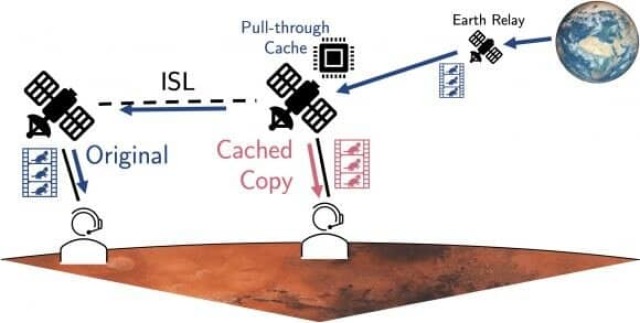Sooner or later humanity will reach the Red Planet, but will the first Martians be able to stay online? Two German researchers believe that yes.
One of the problems that will arise for future astronauts who will fly to the Red Planet is the need to transfer a huge amount of data to Earth. The Internet is ideal for these purposes. But is it possible to create a sufficiently reliable information network on Mars for both similar and personal needs? Researchers from the Technical University of Berlin (Germany) do not see insurmountable obstacles on this path.
The idea of an interplanetary Internet is not new in itself. Astronauts on the ISS have access to the Network, although they often complain about speed, and Internet pioneers such as Vinton Cerf have already proposed protocols that would allow communication between planets. But the devil, as they say, lies in the details.
There are several serious problems standing in the way of connecting Mars to the Internet, and one of them is bandwidth. Since it is impossible to lay a fiber—optic cable between the two planets, it will be necessary to transmit a signal by radio - as communication with Martian satellites and rovers is carried out today. This method does not provide good speed, especially if the transmitter is not very powerful. So, we need to find an alternative.
One of them was proposed by German researchers: we are talking about boundary calculations . They already allow people on Earth to view streaming services like Netflix and Disney+. Streaming movies requires huge bandwidth, so streaming services distribute the load between their servers to provide faster speeds. For example, if a user is watching a new Marvel movie, Disney+ sends data not from Orlando, Florida, but from a local server located closer to the client's home. The load is distributed between the servers, so none of them is overloaded. This is quite different from the typical approach of earlier Internet services.
In their work, hosted on the arXiv preprint server, the scientists stated that the key to creating a network of edge computing around Mars is not only in local access to data, but also in a certain level of redundancy of the communication channel. Therefore, they propose to build a grouping of satellites around the Red Planet: nine vehicles in each of the nine orbital planes, a total of 81 satellites. As with many groupings, the satellites will communicate with each other to have redundant data backups. This means that different landing sites on Mars will be able to communicate with two or three satellites at any given time. For advanced missions, ground servers can be used for even faster data retrieval.
The construction of such a system will not be cheap, so the authors of the study suggest building the grouping in stages, starting its creation long before the landing of the first person on the Red Planet. Thus, when the earthlings do get to Mars, the grouping will already be working, providing a new colony of people with a permanent connection to home.
It is worth noting that the very idea that communication between the Earth and the Red Planet will go mainly by radio is not generally accepted. Many experts believe that laser transmitters are better suited for this: if the signal is received by Earthlings' satellites, the atmosphere will not interfere with the laser, and the scattering of its signal at interplanetary distances will be noticeably smaller than radio waves.

